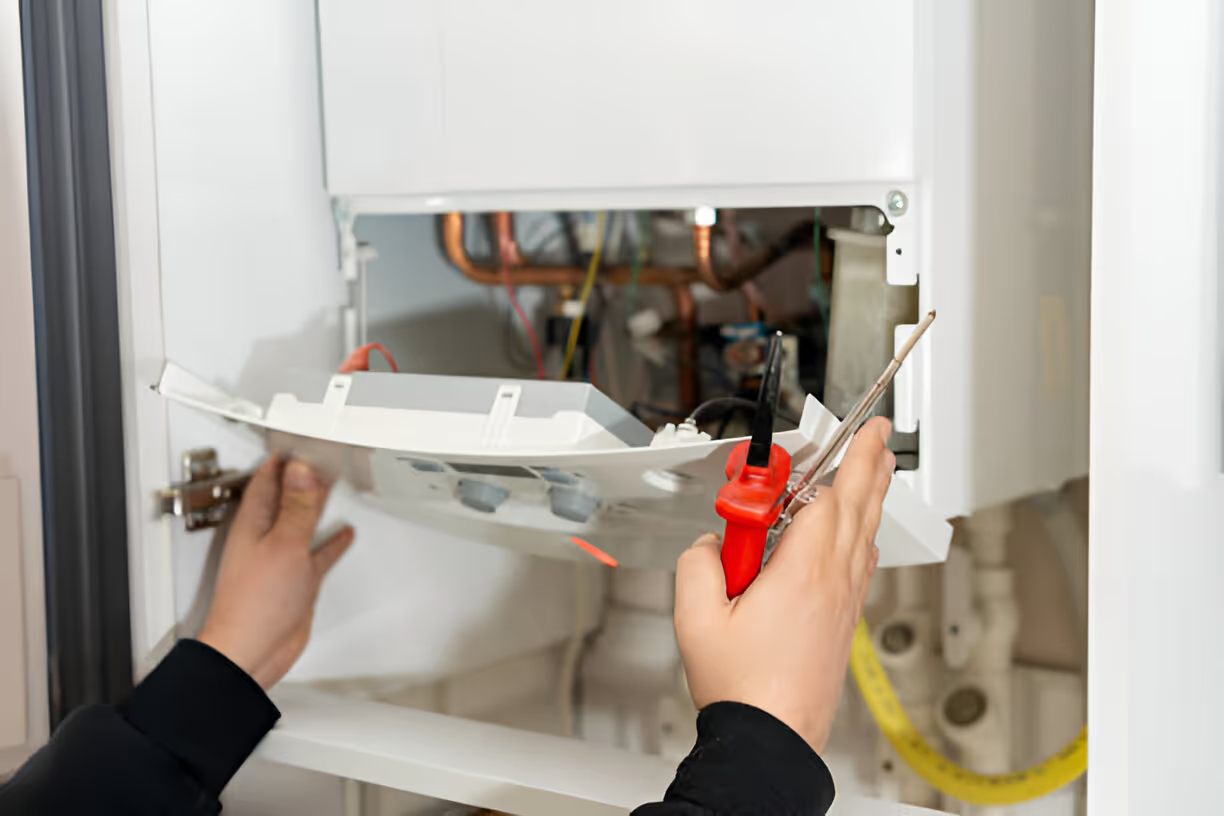Boiler Tune-up in Atco, NJ
Boiler Tune-up in Atco, NJ
A professional boiler tune-up keeps your heating system safe, reliable, and efficient through South Jersey winters. In Atco, NJ homes that face cold, damp winters and frequent heating cycles, a well-maintained boiler reduces breakdown risk, lowers fuel use, and prevents dangerous carbon monoxide incidents.

Why a boiler tune-up matters in Atco, NJ
Atco experiences sustained cold snaps and high humidity in shoulder seasons, which put extra load on boilers and increase corrosion risk in older systems. Furnaces and boilers that go long without service often suffer from reduced efficiency, soot buildup, weak ignition, clogged condensate traps (on high-efficiency units), and venting problems from bird nests or chimney deterioration. A tune-up addresses those issues before they become an emergency, preserving comfort and indoor air safety.
Common boiler problems we see in Atco homes
- Hard starting or repeated lockouts due to ignition or control issues
- Yellow or sooty burners from improper combustion or lack of cleaning
- Fluctuating temperatures from air or water-side restrictions
- Low boiler pressure, leaking valves, or expansion tank problems
- Blocked condensate drains or venting/chimney obstructions on high-efficiency boilers
- Elevated carbon monoxide risk from cracked heat exchangers or poor draft
What a professional boiler tune-up includes (step-by-step)
A comprehensive tune-up is a methodical inspection and adjustment process designed to restore safe, efficient operation. Typical tasks performed:
- Visual inspection and system history review
- Check piping, valves, relief valve condition, visible leaks, and boiler labeling. Inspect flue, chimney, and vent connectors for corrosion, obstruction, or improper slope. Review past service notes if available.
- Combustion analysis and adjustment
- Measure combustion gases using a flue gas analyzer to evaluate oxygen, carbon dioxide, and carbon monoxide levels. Adjust the air-to-fuel ratio so the burner burns cleanly and efficiently. This improves safety and reduces fuel consumption.
- Burner cleaning and calibration
- Remove and clean burner components and ignition electrodes if accessible. Calibrate burner settings to manufacture specifications so the flame pattern and heat output are correct.
- Controls, thermostat, and electrical checks
- Verify thermostat operation and setpoint accuracy, inspect all control wiring, and test safety interlocks, limit switches, pressure and temperature sensors, and the low water cutoff.
- Safety testing including carbon monoxide checks
- Scan the boiler area and living spaces for carbon monoxide with calibrated detectors. Test safety devices such as pressure relief valves and emergency shutoffs.
- Water-side inspection and system optimization
- Check boiler water pressure, look for sediment or scale, inspect the expansion tank, and test circulator pumps. On hydronic systems, verify flow and bleed air from radiators or baseboards as needed.
- Flue draft and vent integrity testing
- Confirm proper draft direction and strength. On sealed combustion or high-efficiency units, inspect condensate lines and traps for clogs or leaks.
- Performance optimization and customer review
- Fine-tune settings for best seasonal performance and walk through findings and recommendations in plain language so you understand any follow-up needs.
Expected outcomes after a tune-up
- Improved fuel efficiency and lower energy use during the heating season
- More consistent, reliable home temperatures and faster warm-up times
- Reduced risk of carbon monoxide leaks and safer operation overall
- Fewer breakdowns and longer equipment life, especially for older boilers
- Clear understanding of any parts that need repair or replacement before they fail
Estimated time and cost factors
- Typical tune-up time: Most residential boiler tune-ups take about 60 to 120 minutes depending on boiler type, accessibility, and system complexity. High-efficiency condensing boilers or multi-zone systems may take longer.
- Cost factors (what influences price): age and make of the boiler, whether parts or filters need replacement, accessibility of the unit, extent of cleaning required, and presence of additional issues such as leaks, corroded flue sections, or required controls replacement. A thorough inspection will identify any additional repairs and the parts involved.
Pre-appointment preparation tips for Atco homeowners
- Clear the area around the boiler for safe access and good working space. Move boxes, paint cans, or stored items away.
- If your boiler room has pets, secure them or place them elsewhere during the visit.
- Have the system controls and thermostat accessible and note any recent problems or odd noises. Jot down when issues started and any patterns (e.g., only at night).
- If you have recent service records or manuals, place them where a technician can review them quickly.
- For homes with gas service, ensure any meters or gas shutoff valves are accessible and unobstructed.
How tune-ups prevent common boiler failures
Regular maintenance corrects the root causes that lead to most residential failures: soot and scale reduce heat transfer and cause overheating; faulty controls lead to unsafe cycling and premature component wear; clogged condensate or vent lines create pressure and draft problems that stress the system. By catching burner inefficiencies and worn safety components early, you avoid emergency callouts during freezing weather and prevent small leaks from becoming major water damage events.
Maintenance schedule recommendations for Atco homes
- Annual tune-up: For most gas and oil boilers, schedule a tune-up once per year before the heating season to ensure safe startup and peak winter performance.
- Twice-yearly checks: High-efficiency or older systems with known issues may benefit from semi-annual inspections.
- After repairs or conversions: Any time a repair involves combustion components, a follow-up combustion analysis and safety retest should be performed before regular operation resumes.
A professional, detailed tune-up is an investment in safety, fuel savings, and the long-term reliability of your heating system. Regular service helps Atco homeowners avoid winter interruptions and keeps indoor environments safer and more comfortable during the coldest months.
Customer Testimonials
Our customers consistently praise our exceptional service and quality products, highlighting their satisfaction and loyalty.


